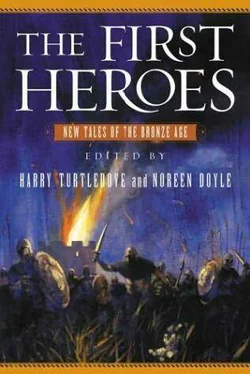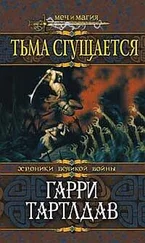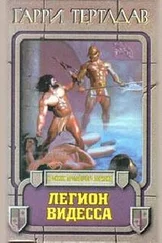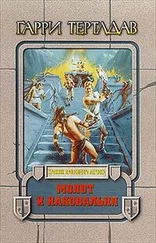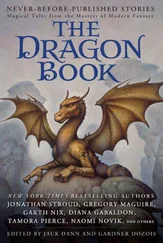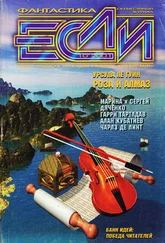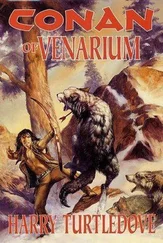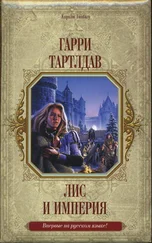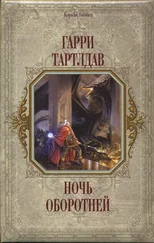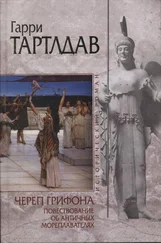Гарри Тертлдав - The First Heroes
Здесь есть возможность читать онлайн «Гарри Тертлдав - The First Heroes» весь текст электронной книги совершенно бесплатно (целиком полную версию без сокращений). В некоторых случаях можно слушать аудио, скачать через торрент в формате fb2 и присутствует краткое содержание. Жанр: Фантастика и фэнтези, на английском языке. Описание произведения, (предисловие) а так же отзывы посетителей доступны на портале библиотеки ЛибКат.
- Название:The First Heroes
- Автор:
- Жанр:
- Год:неизвестен
- ISBN:нет данных
- Рейтинг книги:3 / 5. Голосов: 1
-
Избранное:Добавить в избранное
- Отзывы:
-
Ваша оценка:
- 60
- 1
- 2
- 3
- 4
- 5
The First Heroes: краткое содержание, описание и аннотация
Предлагаем к чтению аннотацию, описание, краткое содержание или предисловие (зависит от того, что написал сам автор книги «The First Heroes»). Если вы не нашли необходимую информацию о книге — напишите в комментариях, мы постараемся отыскать её.
The First Heroes — читать онлайн бесплатно полную книгу (весь текст) целиком
Ниже представлен текст книги, разбитый по страницам. Система сохранения места последней прочитанной страницы, позволяет с удобством читать онлайн бесплатно книгу «The First Heroes», без необходимости каждый раз заново искать на чём Вы остановились. Поставьте закладку, и сможете в любой момент перейти на страницу, на которой закончили чтение.
Интервал:
Закладка:
About half my followers had had some such experiences, being of well-to-do families. Most of the rest had paddled logboats as far as needful for fishing, sealing, or taking birds' eggs. A few had not, Ernu among them; their sort had all it could do scratching out a bare living inland. I supposed—then—that none of them came along for anything more than the reward he was offered or gave the meaning of our emprise any more thought than would an ox. However, their backs were strong, and if we must fight, their flintheaded axes and spears should be almost as good as sharpened bronze.
Sixty men in two ships of twenty-four paddles, we left behind cheers and wellwishings. The aftermath of yestereve's farewell carousel buzzed in us like bees. The wind soon blew that out. It was not unduly high, nor were the seas ever violent. When anyone got sick, he suffered chiefly from the jokes of his comrades. Back in those years, the weather seldom turned truly evil. Old folk did say it had been worsening throughout their lifetimes. But more often than not it was still mild. The question that troubled us until it prompted this expedition was: What had gone wrong in the far South, and what must we look for in time to comer1 What should our kings do?
I could not feel fearful now. The water sparkled, the wind bore salt and tang and enough cold to rouse the blood, the sky was full of wings, bird-cries and wave-whoosh mingled with the paddle-master's chant, keel and sheer horns traced our path before and abaft our hull, curving up toward heaven, while withy-bound strakes slipped through the waves as lithe as a dancer.
Thus we went onward, north along Yutholand until we rounded its tip and bore south again. At the end of each day, we'd beach our craft and make camp for the night, unless we came on a settlement. When we did, we were received gladly. A small gift or two from our stock of trade goods was enough for such villagers. Sometimes after the dining and drinking, some girls, low-born but pleasing, would wander off into the meadows hand in hand with some of us leaders. The nights of late spring were shor tening and lightening toward summer, and the moon turned full just then.
We did not linger. Before long the shore bent west. Shortly thereafter we reached the estuary of the River Ailavo and started up it.
I have heard that it is a torrent in the mountains from which it rises. But that is far south—far indeed; somewhere beyond them, bordering seas warmer and gentler than ours, lie the lands of such peoples as the Hellenes, which to us in this shrunken age are almost fables. Once in the lowlands, the river runs broad, slow, often shallow, northwesterly through a distance that it might take an unhindered man half a month to walk, until it empties into the Western Sea. Paddling against that current wasn't hard, but sometimes we had to jump overboard and manhandle our ships across sandbars.
This is a land of vast and gloomy forests, dominated by the oak, but one finds much clearing and a few settlements along the stream. The dwellers are akin to us, though there is less wealth among them. Livestock are plentiful but small and scruffy. Men often wear no more than a leather cloak, and anything else is likely to be skin also; however, women usually have coarse linen undergarments and are always long-skirted, never bare-legged in warm weather. These people burn their dead like us, but still raise mounds over chieftains. Not even those men go clean-shaven in life, though all who are free do trim their beards and coil their hair up in a braid. Yes, chieftains; there is no king over any tribe, let alone over several, and each tribe is scattered in single farmsteads or tiny hamlets through a large territory. Maybe it is their backwardness that makes them so apt to wage war on each other.
However, traders have little to fear, unless that too has changed by now. They have always been traveling on the Ailavo, from both the North and the South and back again. The riverside folk have long since learned that leaving them in peace means more goods than their back-country cousins can hope for. I think that meeting strangers, hearing new tales, getting some ongoing knowledge of the world beyond these woods, enriches their lives still more. Certainly a visit delights them.
I recall one especially, because it came to matter very much to me. We had been on the river for several days, the fog and tidewater of the coast lay well behind us, when, following Herut's advice, we stopped at a village called Aurochsford. It was the biggest we had seen and the farthest he himself had ever reached: for it was a staging post. Few men have made the whole distance between North and South, none in living memory, and it is said that they went by sea, steering clear of mountains, wildernesses, robber tribes, and alien languages. By far the most wares have gone overland, year after year, from hand to hand, the exchanges usually occurring at time-honored meeting grounds such as this. Not everything passed all the way, of course; cattle, slaves, and the like began and finished their journeys at places in between. But amber, furs, train oil—and copper, bronze, brightly dyed cloth, finely wrought cauldrons—flowed from end to end of a network of routes across the whole known world.
So had it been. So was it no longer.
We drew our boats ashore where, I could see, traders were wont to. Townsfolk flocked eagerly around. Nevertheless we left a guard, our thirty-odd commoners, camped nearby. They would have been ill at ease anyway, unused to foreigners as they were. The tongue spoken here was so changed from ours that I myself, who had ranged abroad somewhat, could follow it only slightly and with difficulty and say almost nothing. I put my young kinsman Athalberh in charge. Somebody high-born must be. He sulked, but a duty is a duty. The headman, named Wihta, invited the rest of us to feast. There was barely room in his house for so many. Herut, I, the captain of our second craft, and two more sat benched with him and a few others at a trestle table which was brought in. Most were crowded wherever they could find a space, mainly on the floor. Come night, they would be quartered in humbler homes. Not that this one was any better than a fairly well-off farmer's in Sealland—nothing like my father's hall, where hangings decked the walls, gold and copper gleamed, the carven pillars seemed well-nigh alive. Nor were we served a meal to boast of— game, cheese, barley bread, with never an herb to season it. I can tell Athalberh that he's missed very little, I thought with an inward grin.
The trenchers had been cleared away and the women were going around with jugs of ale to refill horns when Wihta wondered aloud, "Few have come to us straight from their homelands; yet you tell us that you mean to go on. Never have I seen traders traveling in two boats at once, or ships so big, yet you have filled them much more with armed men than goods. What is your intent?"
This is how I remember the talk. It really went slowly and awkwardly through Herut, the interpreter. He glanced at me. As commander, I ought to reply. "We seek to learn how it is that no more wares are coming from the South," I said. "That's a grave matter, especially the metal."
"Why, you've got to have heard. Wild tribes with terrible weapons have poured in from the Southeast, plundering, killing, taking the land for themselves. Who would be so mad as to try carrying riches through?"
"Yes, we know. Tidings have reached us, piece by piece, year by year. And we know the weapons are iron. Somehow those folk have learned to smelt and work the stuff. Maybe renegade southerners taught them the art, maybe their gods did—who can say?" A shiver went through the company. I groped for workaday words. "First they'd have to find the ore, whatever it looks like. My father thinks it must be plentiful in their homeland, wherever that is. Be this as it may, suddenly they are as well-armed as Hellenes or Persians or, or any of the nations that live in . . . cities}" I knew only tales of huge and wonderful settlements where there were gleamed buildings of polished stone, and wasn't sure whether I had the name right.
Читать дальшеИнтервал:
Закладка:
Похожие книги на «The First Heroes»
Представляем Вашему вниманию похожие книги на «The First Heroes» списком для выбора. Мы отобрали схожую по названию и смыслу литературу в надежде предоставить читателям больше вариантов отыскать новые, интересные, ещё непрочитанные произведения.
Обсуждение, отзывы о книге «The First Heroes» и просто собственные мнения читателей. Оставьте ваши комментарии, напишите, что Вы думаете о произведении, его смысле или главных героях. Укажите что конкретно понравилось, а что нет, и почему Вы так считаете.
